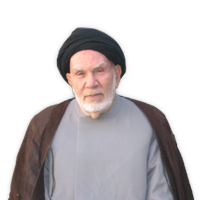Why did Mumkin come to this world?
In the Name of Allah
Why did Mumkin come to this world?You may have asked yourself the following question many times:
“Why did I come to this world?”
A more general question would be:
“Why did Mumkin come to this world?”
We present two arguments in response to the above questions:
1. The reason for Mumkin coming to this world is to receive blessings.
Mumkim came to receive blessings from heat, from breeze, and from air. He came to make use of the manifestations of the world.
(Through this argument, all views which say philosophy causes one to become symbolistic are rejected since even if we accept only this reality that we have come to this world to make use of the manifestations of the world, we will no more move towards lethargy and disappointment and our lives will not be merely a repetition of events and actions.)
Esteemed researcher and philosopher, Ostad Mousavi says to all those who ask, “Why did we come to this world?”
“You came to find the manifestations of the world; you came to receive
blessings.”
Which one would be better; if you had not come to this world or now that you have come?
If you did not exist, there would be total inexistence and inexistence constitutes evil. You do not understand the amount of favour you have received from Almighty Allah because of your existence.
2. The second argument explains that existence in the world is a necessity. In other words, your coming to this world was necessary for the completion of the world just like bricks in a building that even if one brick is missing the building will be defective. They give another example too which is that our body is like printing letters. In other words, for printing, 28 Arabic letters or 32 Farsi ones should be placed next to one another. If any of the letters is missing, printing will be defective and incomplete. Hence, they say we came to complete the system of the world.
However, the question which arises here is that is our coming to this world similar to printing letters, i.e. do people need each other or is it a more significant issue and is it the world which needs the person?
Esteemed scholar, Ostad Mousavi says, “If we accept that people need one another, their role will be that of supplementation. In other words, the first person strengthens the second, the second the third and so on.
However, if we accept the second view and say that the world needs the person, this means that the person is a principal part of the system of creation and that he/she has a mission. According to this view, the imperfect should be sacrificed in favour of the perfect. For example, food should be sacrificed in favour of your stomach since your existence in the world is for a significant purpose.
It is a rule that the imperfect should always be sacrificed in favour of the perfect and the inferiors in favour of the superiors. This is the rule of necessity in the system of the world.
Hence, there are two views on the reason for Mumkin coming to this world: 1. to receive blessings, 2. for a significant role in the system of the world.
If we consider our coming to this world to be for a significant purpose, an example would be like when fruits are picked and the ripe ones are kept because they are perfect, but the rotten fruits are disposed of because they are imperfect. Always the incomplete should be sacrificed in favour of the complete. Man eats lamb or mutton as a sheep is an imperfect animal and should be sacrificed in favour of the perfect.
Marx, Feuerbach, Hegel, and Russell believed if Mumkin did not exist, Wajib would not be known. However, divine philosophers believe: Mumkin came to receive blessings and came for a significant purpose in the world.
Every Mumkin has a mission and a significant purpose and should come to know what his/her mission and purpose is.
How can one come to know what his/her mission in the world is?
Plato believed the entire world could be a utopia and all scholars and virtuous if those who rule were wise masters. He said man will not be able to understand the secrets of the world without being in the path of a sagacious master.
What we believe is that the most significant issue is the kneeling down before a sagacious master who has moved along the path of wisdom and spirituality and without the existence of a wise master, one will not be able to find the reality and the reason why he/she has come to this world, i.e. his/her mission.
The social conclusion of the rule that the imperfect should be sacrificed in favour of the perfect is as follows:
Imperfect people, too, should be sacrificed in favour of the perfect. In other words, if a hundred million imperfect people who have no wisdom, morality, or spirituality are crushed but even one drop of purity is not achieved, such imperfect people should be sacrificed in favour of the perfect.
If the reason for coming to this world is for our dependence on others and our role is merely that of strengthening and supplementing, all will have similar roles. However, if our mission is one of a significant purpose, the imperfect should be sacrificed in favour of the perfect.
This is why when our Infallible Imam arrives, the imperfect throws himself at the feet of the Imam saying, “May my life be sacrificed for you as I am imperfect, and you perfect, hence I should go and you, the perfect, remain.”
Thus, perfect is he who has come to know God better, higher, and more beautiful than others. Perfect is he whose inner light is connected to that of Wilayat and Ismat. Perfect is he who is truly a believer in and a follower of the Ayahs of the Holy Quran. His looking is that of the Quran and his steps in line with the Quran, not with his own desires. Perfect is he who does whatever the Quran approves.
Perfect is he who moves towards Transcendent Theosophy (Hikmat Mutia’li) and revives himself from within through the bases of science, philosophy, theosophy, and gnosticism. He should know what happened when Allah decided to create and what the secret behind this creation was. He should know why God created. He should know the meanings of divine Lauh and Qalam (paper and pen) and Qaza and Qadar (predestination).
Perfect is he who understands he should not say, “Why did You create me?” in all events or does not ask, “What sin did I commit that such an unpleasant event happened to me?” All such complaints cause the foundations of our belief in God to become shaky.
The symbol of absolute divine gnosticism and wisdom, the person who is the most perfect of all, who has nothing within but belief and certainty in God, is the Holy Hazrat Zeinab (SA), who in spite of all events which came upon her and her family during and after Ashura and losing many of her loved ones, when asked, “What did you see in Karbala?” she replied:
“I saw nothing but beauty.”
“I swear by God what I saw was beauty. Verily, the martyrdom of Imam Hossein (AS) and his companions was nothing but an exchange of love with our Creator.”
--------------------------------------------------------------------------------
[1] Mumkin al-Wujud means contingent existence, which is the existence of created things that may or may not exist. On the other hand, Wajib al-Wujud is necessarily existent and defines the existence of Allah Most High.




Comments
0